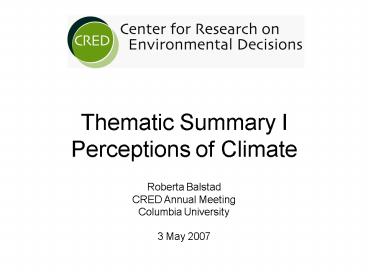Thematic Summary I Perceptions of Climate PowerPoint PPT Presentation
1 / 12
Title: Thematic Summary I Perceptions of Climate
1
Thematic Summary I Perceptions of Climate
- Roberta Balstad
- CRED Annual Meeting
- Columbia University
- 3 May 2007
2
Session Overview
- Summary of CRED work on perceptions of climate at
the mid-point of the Center - No formal presentation on projects
- Panel Discussion
- Addressing issues that cut across projects
3
Three Components of Climate Perceptions
- Detection
- Framing
- Attribution
- All are related to decision making
4
Detection Types of Climate and Climate Change
- Seasonal framework
- Single extreme events (blizzards, drought,
floods) - Variability around a mean but without detectable
patterns - Broad patterns and processes (perceptible
patterns of change, trends, e.g., glacial
melting) - Secondary and tertiary impacts of climate
processes (ecological, agricultural, economic,
and health impacts)
5
The External Influences on Framing Perceptions of
Climate
- Personal observations
- Expectations based on experience
- Information/education obtained from
trusted/respected external sources - Group interactions/dynamics shape interpretations
of observations and experiences - Media/advertising/government policy create
expectations - Economic pressures and consequences
6
Attribution
- Attribution or interpretation is influenced by
- Experience (individual and collective)
- Expectation (individual and collective)
- Authoritative Interpretations and interactions
(group and authority figures)
7
CRED Projects Addressing Perceptions of Climate
- Perceived Warming in Alaska, Florida, and New
York City - Living under Climate Uncertainty Agricultural
Decision Making on the Great Plains - Decision Making Under Risk of Extreme Climate
Events Among Farmers in the NE US - Perceptions of Glacier Retreat
8
Status of Projects
- Years 1-3
- Perceived Warming in AK, FL, NYC
- Years 3-4
- Living under Climate Uncertainty in Grasslands
- Years 4-5
- Glacial Retreat
- Hudson Valley Agriculture
9
Goals and FindingsAlaska Perceptions of Warming
- Goals
- To examine the role of experiential factors in
climate change risk perception, policy
preferences and adaptation behaviors in a region
currently experiencing significant climate
change. - Findings
- Preliminary results have found that Alaskans have
detected the change in local climate - Attribute this change to anthropogenic climate
change - Talk about global warming as part of everyday
conversation - Believe global warming is a current threat to
Alaska - Believe global warming will have significant
impacts on both Alaska and the world - Yet, Alaskans are no more worried than the
American public as a whole - Fewer perceive global warming as a serious threat
to themselves or their communities than the
American public does and, - Half see it as long-term problem requiring more
study before acting.
10
Goals and FindingsGrasslands
- Grasslands Goals
- To examine historical evidence for agricultural
decision making, testing ideas about experiential
vs. analytical DM, the finite pool of worry, the
role of social goals, promotion/prevention, and
single action bias using these data. - To understand the real-life and over the long
term context for agricultural decision making
under climate uncertainty. - To examine agricultural behavior under periods of
weather variability in the 19th century and
under a single, major climate event (the drought
of the 1930s) - Findings
- Climate impacts are filtered and shaped by
social, economic, and technological conditions - 19th century farmers made both active and passive
decisions and the role of climate change, public
policy, and economic pressures played different
roles in each. - The federal government played a continuing role
in mitigating climate impacts in agricultural
areas - The past can be used to test behavioral theory
and also to suggest ideas for testing in labs
11
Related CRED Activities and Research
- Learning and Information Processing Session II
- Experiential vs. Analytical Basis for Decision
Making - Social Goals and Interactions Session III
- Influence of social groups on perception,
framing, and attribution - Participatory Processes Session IV
- Group processes of detection and framing
12
Discussion Panel
- Kenny Broad
- Brad Lyon
- Roly Russell
- Ben Orlove
- Elke Weber

